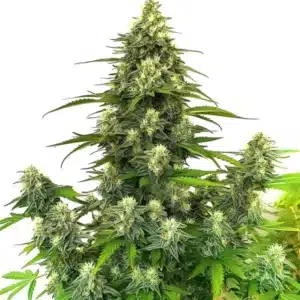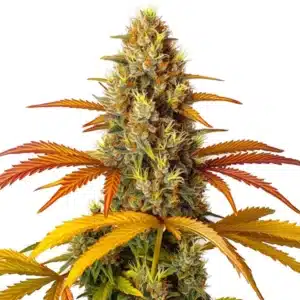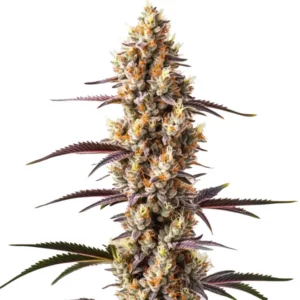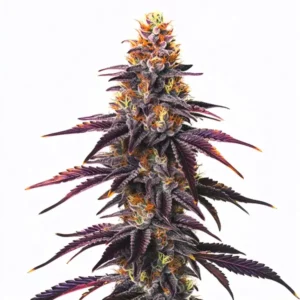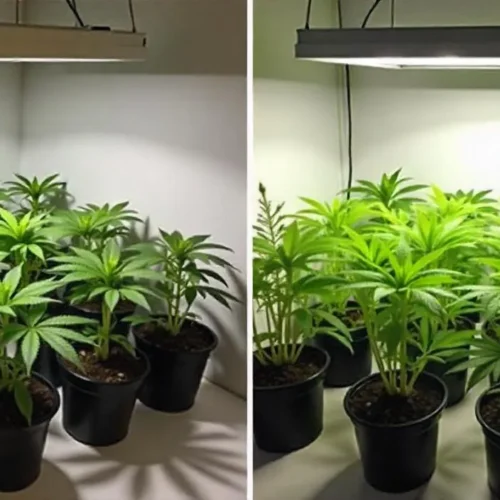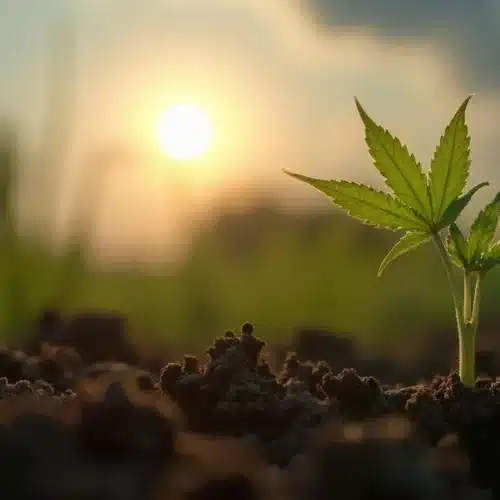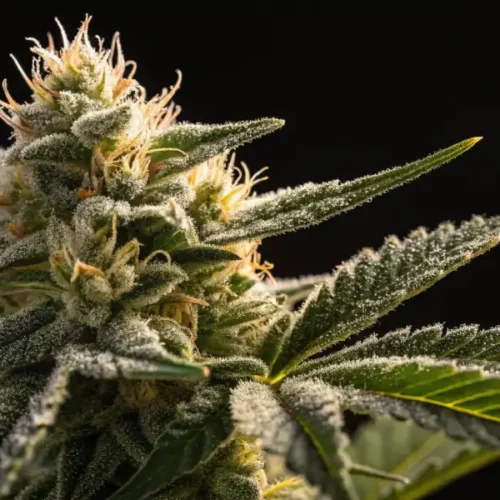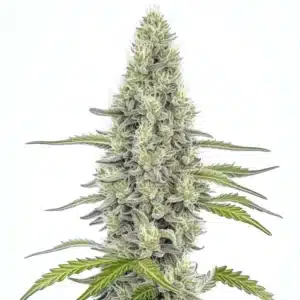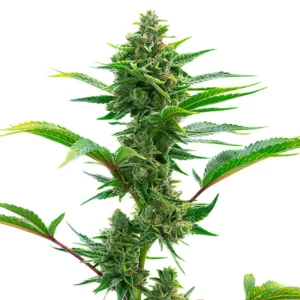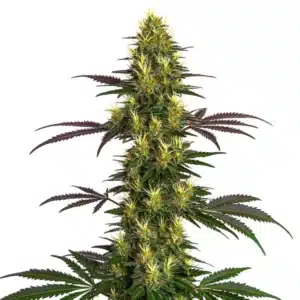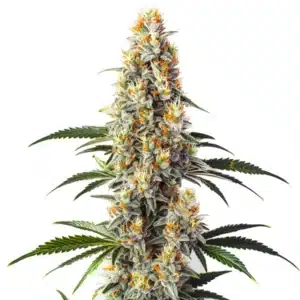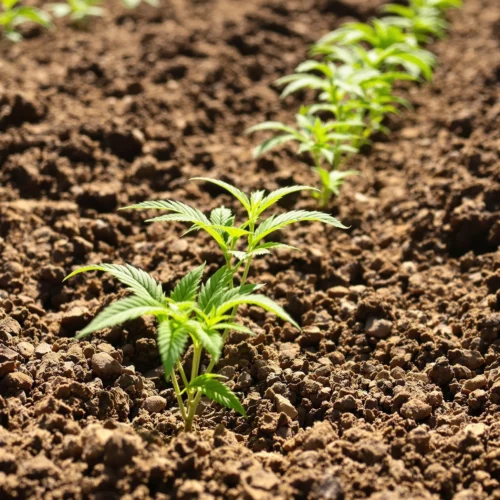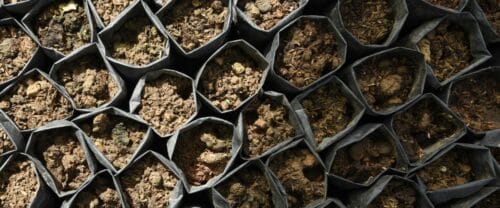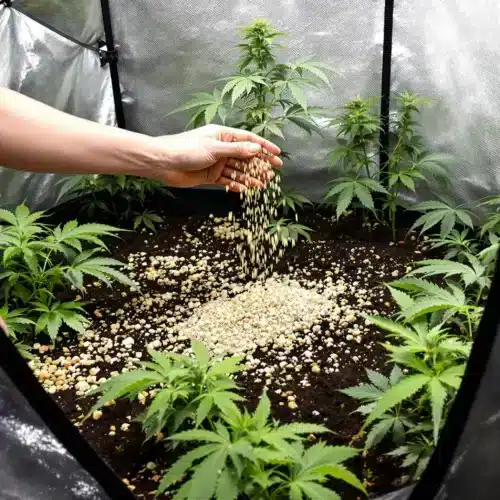Knowing Organic Soil for Weed Cultivation
What Makes Soil Organic?
When it comes to growing high-quality cannabis, the foundation of your plants’ health lies in the soil. But what exactly makes soil organic, and why is organic soil for weed cultivation so important? Organic soil is defined by its composition it is free from synthetic chemicals, pesticides, and fertilizers. Instead, organic soil for weed is enriched with natural materials like compost, worm castings, and organic matter that break down over time, providing a steady supply of nutrients to your plants.
The key to organic soil for weed cultivation is its living ecosystem. Rich in beneficial microbes, fungi, and bacteria, organic soil creates a symbiotic environment where these microorganisms work together to break down organic matter and release nutrients in a form that plants can easily absorb. Amending soil for cannabis with organic materials enhances this process, ensuring your plants receive the nutrients they need. This natural approach not only feeds your cannabis plants but also helps maintain soil structure and fertility, making organic soil a sustainable choice for cannabis cultivation.
Benefits of Using Organic Soil for Cannabis
Using organic soil for weed cultivation offers numerous benefits that go beyond just feeding your plants. One of the most significant advantages is the improvement in soil health. Because organic soil is alive with beneficial organisms, it promotes a balanced ecosystem that supports long-term plant health. This means your cannabis plants will be more resilient to stress, pests, and diseases.
Another key benefit of organic soil for weed is its ability to produce better-tasting and more potent buds. Many growers believe that cannabis grown in organic soil has a richer terpene profile, resulting in more aromatic and flavorful flowers. Additionally, because organic soil releases nutrients slowly over time, there’s less risk of nutrient burn, which can occur with synthetic fertilizers. This slow-release feeding method allows your plants to thrive without the risk of over-fertilization, leading to healthier, more vigorous growth.
Key Components of High-Quality Organic Soil
High-quality organic soil for weed is more than just dirt it’s a carefully balanced mix of ingredients designed to create the perfect environment for cannabis plants. One of the primary components is compost, which provides a rich source of nutrients and organic matter. Compost is packed with microorganisms that break down organic material, releasing nutrients like nitrogen, phosphorus, and potassium into the soil.
Another critical component is worm castings, often referred to as “black gold” by gardeners. Worm castings are the nutrient-rich excrement of earthworms, and they are packed with beneficial microbes that help plants absorb nutrients more efficiently. In addition to compost and worm castings, organic soil for weed often includes materials like peat moss or coco coir to retain moisture, as well as perlite or vermiculite to improve soil aeration and drainage.
These components work together to create a soil that is rich in nutrients, well-draining, and capable of retaining moisture all essential qualities for growing healthy cannabis plants in organic soil.
Promos & Deals
Choosing the Best Soil for Your Cannabis Plants
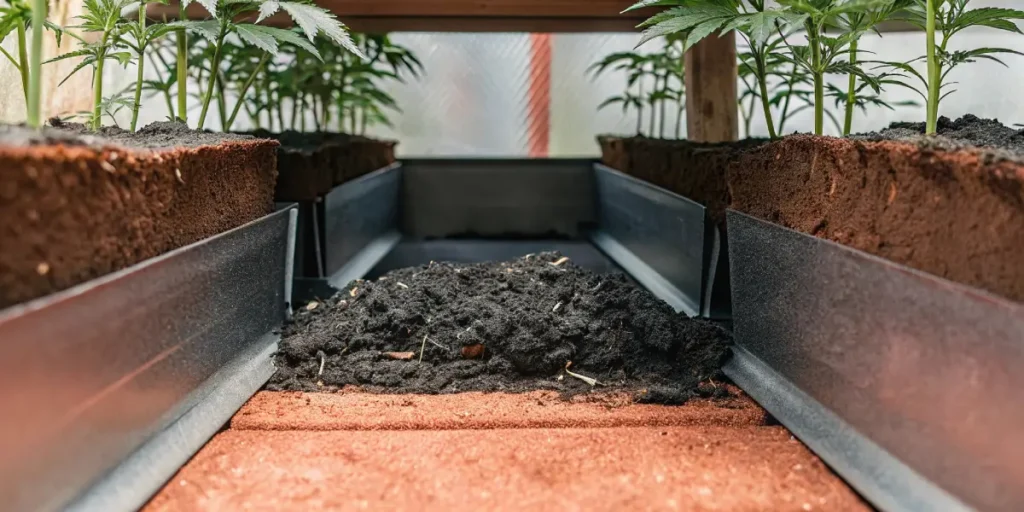
Factors to Consider When Selecting Organic Soil
Choosing the right organic soil for weed is a critical step in ensuring their success. The first factor to consider is the soil’s texture and structure. Cannabis plants thrive in well-draining soil that allows their roots to access oxygen. Look for organic soil that is light and airy, with a good mix of organic materials that prevent compaction.
Another important factor is the nutrient content of the soil. High-quality organic soil for weed should be rich in essential nutrients like nitrogen, phosphorus, and potassium, as well as trace minerals like calcium and magnesium. However, it’s important to choose a soil that is not overly rich, as too many nutrients can lead to nutrient burn or other growth issues.
Finally, consider the pH of the soil. Cannabis plants prefer slightly acidic soil with a pH range of 6.0 to 7.0. Many organic soils are pre-buffered to maintain the correct pH, but it’s always a good idea to test the soil yourself to ensure it’s within the ideal range. By choosing a soil that meets these criteria, you’ll give your cannabis plants the best possible start in organic soil.
Recommended Brands of Organic Soil for Weed
When it comes to selecting the best organic soil for weed, several brands have earned a reputation for producing high-quality products. One popular choice is FoxFarm’s Ocean Forest Potting Soil, which is known for its rich blend of earthworm castings, bat guano, and fish meal. This soil provides a nutrient-rich environment that is ideal for cannabis cultivation.
Another highly recommended brand is Black Gold Organic Potting Soil. This soil mix is fortified with organic fertilizers and mycorrhizae, a type of beneficial fungus that helps plants absorb nutrients more effectively. Black Gold is also known for its excellent drainage and aeration properties, making it a top choice for cannabis growers.
Roots Organics is another brand that cannabis cultivators trust. Their Original Potting Soil is a balanced blend of coco fiber, perlite, and natural nutrients like bat guano and kelp meal. This mix provides an ideal environment for cannabis roots to thrive, supporting healthy growth and abundant yields.
These brands are just a few examples of the high-quality organic soils available on the market. By choosing a trusted brand, you can be confident that your cannabis plants will have the foundation they need to flourish in organic soil.
DIY Organic Soil Mix: Ingredients and Ratios
For those who prefer a hands-on approach, making your own organic soil mix can be a rewarding experience. Creating a DIY organic soil mix allows you to customize the ingredients and ratios to suit your specific growing conditions and cannabis strain.
A basic organic soil mix typically includes three main components: a base material, compost, and aeration amendments. For the base material, you can use peat moss, coco coir, or a combination of both. This provides the bulk of the soil’s structure and helps retain moisture.
Next, add compost or worm castings as the primary source of nutrients. A good ratio to start with is one part compost to three parts base material. This will provide a rich supply of nutrients without overwhelming the plants.
Finally, incorporate an aeration amendment like perlite or vermiculite. These materials help improve soil drainage and prevent compaction, ensuring that roots have access to oxygen. A common ratio is one part aeration amendment to four parts base material.
You can also add additional organic amendments like bone meal, blood meal, or kelp meal to boost specific nutrients. Once you’ve mixed all the ingredients, allow the soil to “cook” for a few weeks. This gives the organic materials time to break down and create a nutrient-rich environment that your cannabis plants will thrive in.
Preparing Your Soil for Optimal Cannabis Growth
Soil Preparation Tips for Strong Root Development
The key to growing healthy cannabis plants starts with strong root development. Preparing your organic soil properly can make a significant difference in how well your plants establish themselves. Begin by thoroughly mixing the soil to ensure all components are evenly distributed. This will prevent nutrient hotspots that could harm your plants.
Next, consider adding mycorrhizae fungi to your soil. Mycorrhizae form a symbiotic relationship with plant roots, extending their reach and improving nutrient and water uptake. These fungi also help protect roots from disease and environmental stress. When transplanting your cannabis seedlings into organic soil, sprinkle a small amount of mycorrhizae directly onto the roots to give them the best start.
Finally, water the soil thoroughly before planting. This helps settle the soil and ensures that it has the right moisture level to support root growth. By taking these steps, you’ll create an ideal environment for your cannabis roots to develop, leading to healthier, more resilient plants.
The Importance of pH in Organic Soil Health
Maintaining the correct pH level in your organic soil is important for cannabis growth. The pH level affects how well your plants can absorb nutrients from the soil. Cannabis plants prefer slightly acidic pH, typically between 6.0 and 7.0. If the pH is too high or too low, your plants may suffer from nutrient deficiencies, even if the soil is rich in nutrients.
To monitor and adjust pH levels in organic soil for weed, use a pH meter or testing kit to regularly check the soil. If the pH is outside the optimal range, you can amend the soil with organic materials like lime to raise the pH or sulfur to lower it. It’s important to make adjustments gradually, as sudden changes in pH can shock the plants.
In addition to regular testing, you can use pH-buffering agents like dolomite lime in your soil mix. These agents help stabilize pH levels, ensuring that your cannabis plants have consistent access to the nutrients they need for healthy growth in organic soil.
Enhancing Soil with Organic Amendments
Organic amendments are a powerful way to enhance the nutrient content and overall health of your soil. These amendments include a variety of natural materials that add nutrients, improve soil structure, and support the beneficial microbes that are vital for plant health.
Common organic amendments for organic soil for weed include compost, which adds a broad spectrum of nutrients and improves soil texture. Worm castings are another excellent amendment, rich in nutrients and beneficial microbes that support plant growth. For specific nutrient boosts, you can add bone meal (high in phosphorus for root and flower development) or blood meal (high in nitrogen for leafy growth).
Other valuable amendments include kelp meal, which provides trace minerals and growth hormones, and bat guano, which is an excellent source of nitrogen or phosphorus, depending on the type. By regularly adding these amendments to your organic soil for weed, you can create a rich, fertile environment that supports vigorous cannabis growth.
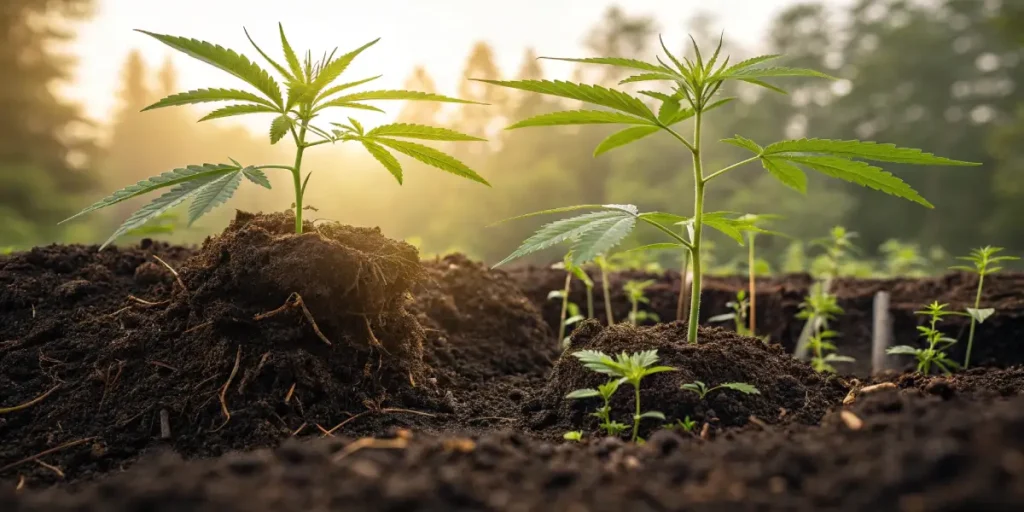
Maintaining Soil Health Throughout the Growing Cycle
How to Keep Your Soil Nutrient-Rich Over Time
Maintaining soil health throughout the growing cycle is key to a successful cannabis harvest. One of the best ways to keep your soil nutrient-rich is through the use of organic top dressings. Top dressing involves adding a layer of compost, worm castings, or other organic materials to the surface of the soil. As you water your plants, the nutrients in the top dressing gradually leach into the soil, providing a steady supply of nutrients.
Another effective method is to use organic liquid fertilizers or compost teas. These can be applied during watering to give your plants an extra nutrient boost. Compost tea, in particular, is beneficial because it introduces a high concentration of beneficial microbes into the soil, enhancing nutrient uptake and overall soil health.
Finally, consider rotating your crops or using cover crops in between cannabis grows. Cover crops like clover or alfalfa can be grown in the off-season and then tilled back into the soil. This practice helps replenish soil nutrients, improves soil structure, and prevents soil erosion, ensuring that your organic soil for weed remains fertile for future cannabis grows.
Watering Techniques for Organic Soil
Proper watering is essential for maintaining healthy organic soil. One common mistake is overwatering, which can lead to waterlogged soil, root rot, and the depletion of oxygen around the roots. To avoid this, water your cannabis plants thoroughly but infrequently, allowing the soil to dry out slightly between waterings.
Using mulch is another technique that can help retain moisture in organic soil for weed. A layer of organic mulch, such as straw or shredded leaves, helps keep the soil cool, reduces evaporation, and encourages beneficial microbial activity. Mulch also slowly decomposes, adding more organic matter to the soil over time.
Additionally, using water that is free from chlorine and other chemicals is important. Tap water often contains chlorine, which can harm the beneficial microbes in your organic soil for weed. If using tap water, let it sit out for 24 hours before using it on your plants, allowing the chlorine to evaporate. Alternatively, use filtered or rainwater to water your cannabis plants.
Managing Pests and Diseases Naturally
One of the advantages of using organic soil for weed is that it supports a healthy ecosystem that can naturally resist pests and diseases. However, issues can still arise, and managing them without chemicals is key to maintaining the organic integrity of your soil.
Introducing beneficial insects like ladybugs or predatory nematodes can help control common pests such as aphids and root-eating grubs. These natural predators help keep pest populations in check without harming your plants or the soil.
For fungal issues or diseases, consider using organic fungicides made from neem oil or potassium bicarbonate. These treatments can be applied directly to the plants and soil to prevent and manage fungal infections without disrupting the soil’s ecosystem.
Maintaining a clean growing environment is also essential. Regularly remove dead leaves and plant debris from the soil surface, as these can harbor pests and diseases. By keeping your garden tidy and using natural pest control methods, you can protect your cannabis plants while preserving the health of your organic soil for weed.
Common Challenges When Growing Cannabis in Organic Soil
Identifying and Correcting Soil Deficiencies
Even with the best organic soil for weed, nutrient deficiencies can occur, affecting the growth and health of your cannabis plants. Common deficiencies include nitrogen, phosphorus, and potassium shortages, which can lead to yellowing leaves, stunted growth, and poor bud development.
To identify deficiencies, regularly monitor your plants for signs such as discoloration, wilting, or abnormal growth patterns. Soil testing kits can also help you determine the nutrient levels in your organic soil for weed.
Once you’ve identified a deficiency, the next step is to correct it using organic amendments. For nitrogen deficiencies, blood meal or fish emulsion can quickly add nitrogen to the soil. Bone meal or rock phosphate can address phosphorus shortages, while potassium can be supplemented with kelp meal or wood ash. By addressing deficiencies promptly, you can keep your plants healthy and productive.
Balancing Soil Microbes for Healthy Plant Growth
Soil microbes play an important function in breaking down organic matter and making nutrients available to plants. However, maintaining a balanced microbial population is essential for the health of your soil and cannabis plants. Imbalances can occur due to over-fertilization, poor soil structure, or the use of chemical treatments.
To maintain a healthy microbial balance in organic soil for weed, regularly incorporate organic matter into the soil, such as compost or worm castings. These materials provide food for beneficial microbes and help maintain a diverse and robust microbial community.
Avoid using chemical fertilizers or pesticides, as these can disrupt the balance of microbes in the soil. Instead, opt for organic fertilizers and pest control methods that support the soil’s natural ecosystem. Additionally, consider using mycorrhizal fungi supplements to enhance the relationship between soil microbes and plant roots, further promoting healthy growth in organic soil.
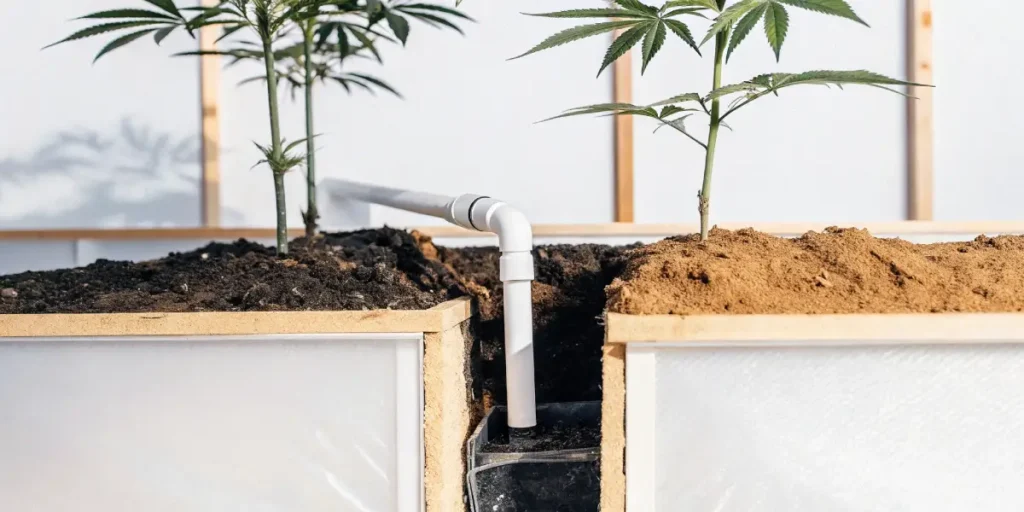
Troubleshooting Common Problems in Organic Soil
Growing cannabis in organic soil comes with its own set of challenges. Common problems include poor drainage, compaction, and nutrient lockout. These issues can lead to slow growth, poor yields, and even plant death if not addressed.
For poor drainage or compacted soil, adding more aeration materials like perlite or vermiculite can improve soil structure and water retention. If nutrient lockout is suspected (when nutrients are present in the soil but not available to the plant), it’s often due to pH imbalances or an excess of one nutrient blocking the absorption of others. Testing and adjusting the soil pH is the first step to resolving this issue.
Additionally, regular observation of your plants can help you catch problems early. Look for changes in leaf color, growth rate, and overall plant health. Early detection and intervention are key to keeping your organic soil for weed in optimal condition and ensuring a successful cannabis harvest.
FAQs About Organic Soil for Weed
How Often Should I Fertilize Organic Soil?
One of the advantages of organic soil for weed is that it often requires less frequent fertilization compared to synthetic soil mixes. Because organic soil releases nutrients slowly, your plants are continuously fed over time. However, depending on the strain and growth stage, you may need to supplement with additional nutrients.
During the vegetative stage, consider top-dressing with compost or a balanced organic fertilizer every 4-6 weeks. In the flowering stage, focus on phosphorus and potassium-rich amendments to support bud development. Always observe your plants and adjust the feeding schedule based on their needs.
Can I Reuse Organic Soil for Multiple Grow Cycles?
Yes, organic soil for weed can be reused for multiple grow cycles with proper care and maintenance. After harvesting your cannabis plants, remove any remaining roots and debris from the soil. Re-amend the soil with fresh compost, worm castings, and other organic materials to replenish nutrients.
Allow the soil to rest for a few weeks to let the amendments break down and rejuvenate the soil’s ecosystem. With regular maintenance and nutrient replenishment, your organic soil for weed can support multiple successful cannabis grows.
What’s the Difference Between Organic Soil and Synthetic Soil Mixes?
The primary difference between organic soil for weed and synthetic soil mixes is the source of nutrients. Organic soil relies on natural materials like compost, manure, and organic amendments to provide nutrients, whereas synthetic soil mixes use chemical fertilizers to feed plants.
Organic soil promotes a healthy ecosystem within the soil, supporting beneficial microbes and fungi that contribute to plant health. In contrast, synthetic soil mixes often lack this living ecosystem, requiring more frequent fertilization and careful management to prevent nutrient burn.
Organic soil is also more sustainable and environmentally friendly, as it avoids the use of synthetic chemicals that can harm the environment. For cannabis growers who prioritize natural cultivation methods and superior plant quality, organic soil is the preferred choice.

